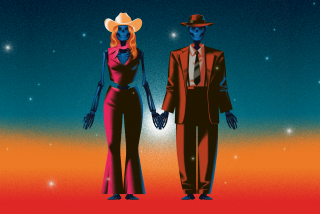TV Review: ‘Bobby Fischer Against the World’
- Share via
I could have told you a few things about Bobby Fischer even before watching Liz Garbus’ excellent, sympathetic yet clear-eyed documentary “Bobby Fischer Against the World,” which premieres Monday on HBO: that Fischer was a world champion chess player; that he disappeared from view at the height of his fame; that he was in some sort of trouble with the government; that he was a fugitive; that he was crazy, or anyway said crazy things; that he died. These things were in the air once; you just breathed them in.
Still, they are only the bones of a story, and in terms of understanding a complicated character, not much better than knowing nothing at all. Garbus, director of the Oscar-nominated, Emmy-winning “The Farm: Angola, USA,” fills in many of the blanks — to an impressive extent, given the obsessively guarded privacy of her subject — in a film that is both meditative and exciting, like the game it concerns, and mercilessly penetrating even as it reserves judgment on a man whose outrageousness practically demands it.
Fischer was a culture star in the late ‘60s and early ‘70s, a rangy kid from Brooklyn who, for a moment, made chess both sexy and patriotic — and, for the first time, profitable. For most Americans then and possibly now, Bobby Fischer was the game. He took the world championship from Boris Spassky in 1972 in a match, well recounted here, whose Cold War symbolism was understood even at the time: “This little thing with me and Spassky,” he says here, “instead of, you know, with bombs we’re having it out over the board.” But even as the world celebrated him, he pulled away from it, becoming more obviously eccentric — not just incredibly demanding — and withdrawing into anti-Semitic conspiracy theories. (He was, many have noted, Jewish himself.)
“Bobby Fischer Against the World” could run as long as a world-championship chess match and not really explain its subject, of course; like anyone, he was who he was in spite of and because of the things that formed him. He had a complicated upbringing. His mother was a politically active polymath whose FBI file ran to 900 pages; the man he believed to be his father, whom he never met, was not; his real father, whom he knew, never admitted it. At an age when most children are gingerly approaching their times tables, he devoted himself obsessively to chess; at age 14, he became the youngest U.S. champion. But he doesn’t seem to have had any real childhood.
This film seems to include every surviving person of importance to the story, and Garbus does a good job both telling a busy tale and transmitting something of the flavor of how chess people understand the game. (“A symphony of placid beauty,” friend Dr. Anthony Saidy calls Game 3 of the Fischer-Spassky match, and helps you understand why.) And notwithstanding a brief rehearsal of historical mad chess champs, there is a welcome lack of clinical diagnosis; it’s interesting and somewhat of a relief not to hear, as we so often do nowadays, the words “autistic” or “Asperger’s” bandied about, even when they so might easily and appropriately stick.
There are a lot of theories propounded here as to why Fischer cracked — the pressures not only of the competition and fame but also of looking straight into the existentially overwhelming possibilities the game represents, likened by Garry Kasparov to “the number of the atoms in the solar system.” But perhaps Fischer gets closest to the facts when he tells an interviewer who wants to know about Bobby Fischer “the man”: “Chess and me, it’s hard to take ‘em apart, you know.”
‘Bobby Fischer Against the World’
Where: HBO
When: 9 tonight
Rating: TV-14 (may be unsuitable for children under the age of 14)
More to Read
The complete guide to home viewing
Get Screen Gab for everything about the TV shows and streaming movies everyone’s talking about.
You may occasionally receive promotional content from the Los Angeles Times.







